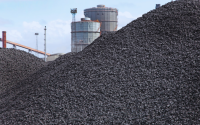Published on Wednesday, August 11, 2004 by the Boston GlobeGeorge M. Woodwell and Kilaparti Ramakrishna
While we are all preoccupied with an unnecessary war costing billions of dollars and eating up time that might far better be spent on the alleviation of poverty and disease, global climatic disruption gains momentum and moves toward irreversible climatic chaos.
The World Bank recently met to consider continued support for development of new sources of fossil fuels, the primary cause of the climatic disruption. It decided to continue support in the interest of offering succor to those less developed nations that might sell oil or coal or gas into the world markets. The action calls attention once again to the growing discrepancy between what the scientific community is saying about the state of the world and what the political and economic communities are willing to hear. The fact is that the environment is being changed in ways that destroy its life-supporting capacities. Immediate effective steps must be taken to stop the erosion.
First, the world must move away from a reliance on fossil fuels -- coal, oil, and gas -- as the energy source for industrialization. There is, of course, enormous resistance to this change. The political and economic interests of the fossil fuel industry and its allies are overwhelming. They argue, in a now stereotypical pattern, that the scientists are wrong, then that the scientists may be right but change is very expensive and the expense is not justified, and, finally, that it is too late to try because we cannot stop the changes.
The World Bank, on the other hand, has an international legal personality and a position of leadership. Its job is to improve the world, to aid in economic development.
While one might question the organization's methods, its mission is certainly not to drive the world into impoverishment. Yet the human undertaking that the World Bank wishes to advance is dependent upon a functioning environment that is being destroyed daily by current use of fossil fuels.
The best way to eliminate a pest, defeat an enemy, or cause the erosion of society is to change the environment out from under it. History is rich in examples as climate or soil or other environmental resources have collapsed and caused the demise of one civilization after another.
The difference now is that the changes are global and the global industrial civilization with all of its successes and all of its promise is at hazard.
The atmospheric burden of human-produced heat-trapping gases, especially carbon dioxide, is more than 30 percent 0above what it was a century ago and far higher than it has been at any time in the last 460,000 years. And it will soar under current policies to levels that are in fact unpredictable as the warming feeds on itself by stimulating further releases of heat trapping gases from forests and soils and as the seas warm and absorb less of the excess carbon dioxide from the atmosphere.
The full effects of heat-trapping gases in the atmosphere, without continued additions, will extend far beyond current predictions.
The failure of the United States and others to take international leadership in correcting this trend is inexcusable, but this failure in no way justifies the action of the World Bank in leading the world into even greater reliance on fossil fuels.
If the bank requires justification in international action, it has it in the Framework Convention on Climate Change, a treaty that has been ratified by all the nations, including the United States, and provides for "stabilizing" the heat trapping gas content of the atmosphere at levels that will protect human interests and nature. It is time for the public to hold the World Bank and other international development agencies to a far higher set of environmental standards than has been set by most of the governments that delegates to the governing board represent.
Failure to do so assures the ultimate and final failure of the central mission of government at all levels, but most conspicuously in the international realm that the international development banks serve.
George M. Woodwell and Kilaparti Ramakrishna are the director and deputy director of the Woods Hole Research Center.






